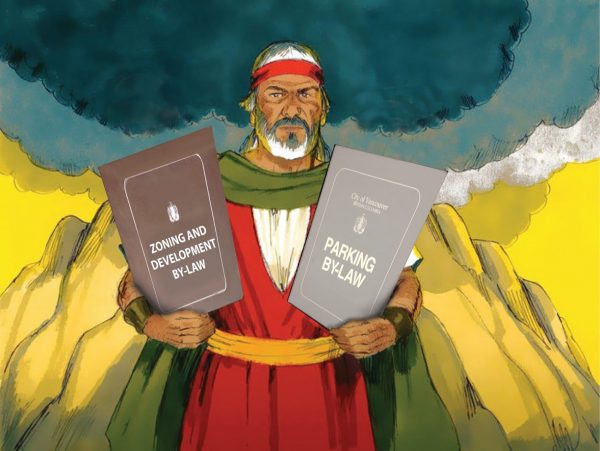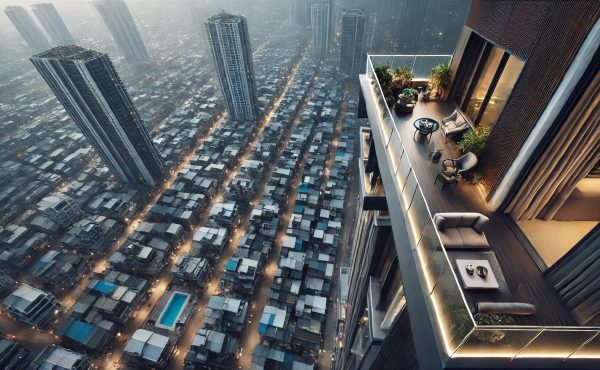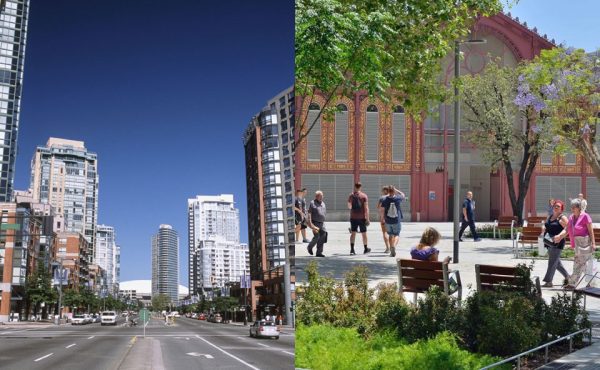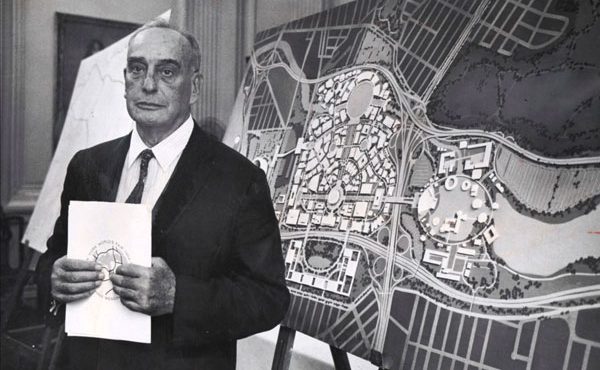
A stroll along Vancouver’s Broadway west of Macdonald offers the pedestrian many small, engaging storefronts. The low awnings provide human-scaled protection from the rain while allowing the “spillage” of goods onto the sidewalk.
The sights, sounds and smells contribute to a lovely walking experience. Each small storefront is unique, even peculiar, contributing in its own way to a larger visual complexity that cannot be codified by generic design guidelines. Some might refer to this prevailing character as “beauty.” The mom-and-pop owners are more than just service providers, they are friends and neighbours whose commitment to local community is expressed through their generosity and volunteerism.
And all of this is under threat from redevelopment.
The political motivation to encourage more market rental housing is laudable, and city staff should be appreciated for their hard work in trying to make these projects fit with their surroundings.
But the market’s understandable pursuit of profitability compels land assembly. Assembling land and building one large project makes more economic sense than building a number of smaller ones. Requirements like elevators, stairs, garbage, recycling and underground parking are a heavy financial burden for smaller projects.
But there’s something you rarely get with these larger projects: an intimate, pedestrian experience, like the mom-and-pop strip of Broadway.
How can we encourage the market to build rental projects (that are still profitable) while maintaining the special qualities that make memorable places?
One answer: smaller, but even more dense, projects without underground parking.
A good case study is Monad at 3351 W. 4th Ave. by the Lang Wilson Practice in Architecture Culture. Monad, with its engaging small frontage, airy outdoor social courtyard and parking elevator system shows us the way forward.
Now imagine a more aggressive version of this project — let’s call it “Morenad.” It would require zoning and parking bylaws to be adjusted to allow greater densities without underground parking on existing narrow lots. More dense, narrow projects like Morenad would make our shopping streets more complex and interesting as social places while providing more housing with greater livability. They would be an alternative to large lot developments requiring land assemblies that are transitioning our local shopping streets into generica.
Right now, Vancouver regulations are encouraging the market to build bigger and bigger. Can we change our municipal regulations, and our tax laws, to reward small lot development? It would mean doing away with expansive underground parking in favour of new, innovative storage systems and welcoming higher density, but the result would be a greener city with fewer cars, better and more affordable housing, reinvigorated streets and homes for mom-and-pops without a legacy of large below grade parking structures that are challenging to repurpose in the future — a quintuple win.
Here’s a short parable that reflects this challenge.
And the prophet said, “We shall rezone our way to affordability.”
And the market responded with large-scale city-transforming initiatives, requiring huge excavated storage places below for fossil-eating machines that would soon be redundant. Who could blame the market for this initiative, especially if the market said “we need fossil-eating machines to sell product.” Who could blame the market for being clever in recognizing that bigger and bigger city-transforming initiatives could be more profitable, even if they require more and more expensive land assembly, and more and more fossil-eating machine storage currently required by the temple.
And market said, “So it shall be done.” And the prophet said, “We shall call it green.”
And the masses began to leave the city as the seas parted towards suburbia where fossil-eating machines could be parked, cheaply, outside the front door.
And the prophet said, “We shall call it green.” And the masses said, “I spend much more time in my car and have much less time for what is important.” And the sellers of fossil-eating machines added, “We shall call it green as in $$$.”
The city became quieter, with fewer and fewer workers to support life and with more and larger places to store fossil-eating machines. Some of these machines only moved when their owners visited. They mostly sat dormant in their excavated storage places below (some estimate the current cost to construct nudging towards six figures per stall for deep multi-level parkades).
And the prophet said “We shall build new ways of moving around so that we do not need these fossil-eating machines.” And we will pay for new ways of moving around by building bigger and bigger city-transforming initiatives.
And these bigger and bigger city-transforming initiatives required by the prophet, and others in the temple, required bigger and bigger storage places below for fossil-eating machines, even though they were supposed to be replaced by the new ways of moving around.
And the prophet said, “We shall call it green.” And those in the temple also said, “We shall call it green.”
And the costs of bigger and bigger fossil-eating machine storage places below were paid directly by the masses, and sometimes visitors, even if they did not want or need fossil-eating machines. And after the masses paid for the fossil-eating machine storage places below, there was no money left to support social, cultural, historic and other important institutions that made the city desirable above. The masses continued to leave the city.
And the prophet said, “We shall call it green.” And some of those in the temple said, “There is no money for the important institutions after we spend it on moving around,” and others in the temple said “housing is too expensive.”
The institutions died, housing costs increased, and as the masses continued to leave the city, families split up. And as families split up, the younger and older ones relied on others for care. And the care was also expensive because the caregivers could not afford to live in the city. And the older ones died. And the younger ones who stayed soon grew up and left the city that they could not afford.
And the prophet said, “We shall call it green.” And the caregivers who left said, “I miss my family, I miss who I serve and I miss the city.”
And there were fewer and fewer neighbours while the vacated neighbourhoods continued to store fossil-eating machines. And because there were fewer and fewer neighbours, there were fewer and fewer volunteers — the volunteers that support the important social, cultural, historic and other institutions that make the city desirable. With fewer and fewer institutions, the masses continued to leave the city.
And the prophet said, “We shall call it green.” And the temple said, “We have no money for the important institutions and now no volunteers.” And the volunteers who left said “I miss my family, I miss who I serve and I miss the city.”
There were no caregivers, volunteers, seniors or children left. The city was a ghost town on Halloween night.
Then the masses who were left, and those who had already left, said, “So it shall NOT be done.”
The masses realized that the prophet, the temple and the market do not really need huge excavated storage places below for so many fossil-eating machines to “sell product.” The masses also realized that if we do not build these storage places, maybe we do not need bigger and bigger city-transforming initiatives requiring expensive land assembly, paid for by new purchasers, to achieve the understandable economy of scale sought by the market.
Maybe it would be OK to build on smaller sites, but at higher densities than today. And if we did more of this, maybe we could still have leftover market value because we would not need to assemble land or build expensive underground parking structures. And maybe the market could contribute some of the leftover value towards new ways of getting around, and also for important city institutions that make cities desirable while also making housing more affordable.
Maybe the shopping streets would be more interesting and vibrant with many small shops, and not just a few large, generic shops, if land assembly was not required to meet market demand, and as dictated by the laws of the temple.
And the masses said, “We shall call this green.” The prophet and temple were silent.
And then, upon reflection, the prophet realized the masses were right. And the prophet instructed the temple to motivate new laws for a new market, a market that spent much less on fossil-eating machine storage below, a market that invented smaller and smaller city-transforming initiatives (requiring no land assembly) and a market that thrived because the masses returned to a city where the social, cultural, historic and other institutions were strong again.
And, finally, a market that recognized the value of strong neighbourhoods, with less and less fossil-eating machine storage, and more and more caregivers and volunteers. A market that placed neighbours above fossil-eating machines. A market that was allowed by the temple to creatively innovate given the talents of industry. A market that delivered better and more affordable housing because the temple made it easy and still profitable.
And the prophet, the temple, the market and the masses said, “And this is truly green.”
*NOTE: This article was originally published on the Tyee.
***
Scot Hein is an adjunct professor in the Master of Urban Design program at UBC. He was previously the senior urban designer with the City of Vancouver.




